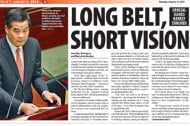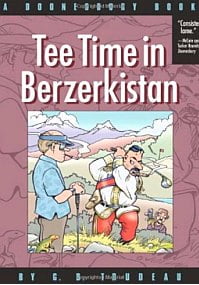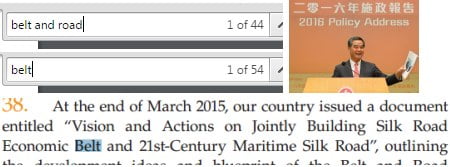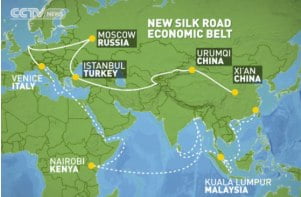Those traumatized, mind-numbed zombies you see staggering around Hong Kong this morning – they’re the poor wretches who had to sit through yesterday’s Policy Address. Even by the usual standards of these tortuous annual rituals, Chief Executive CY Leung’s speech to the Legislative Council was an ordeal.
 The main reason was its big theme: ‘Belt and Road’, also (formerly, at least) known as ‘One Belt, One Road’.
The main reason was its big theme: ‘Belt and Road’, also (formerly, at least) known as ‘One Belt, One Road’.
(An interlude for anyone who needs reminding… This is, of course, the Chinese nationalist central planners’ fanciful vision in which Eurasian hell-holes like Bezerkistan pay Beijing tons of money in return for pointless high-speed rail systems and irreversible membership of the Grand Imperial Greater China Co-Prosperity Zone. It’s the ultimate win-win, with China exporting its excess industrial capacity and leapfrogging the evil Americans in the race to rule the planet.)
The more officials insist that ‘Belt and Road’ offers Hong Kong a vast array of bounteous economic opportunities, the more obvious it becomes that the ‘initiative’ is of no relevance to this city at all. The big debate today is over how many times CY mentioned the phrase in his address. You will read numbers ranging from the high 30s to the low 50s. The South China Morning Post counts 48 times. I am delighted to sort out the confusion with the help of the pdf file and ‘Find’ function. While ‘Belt and Road’ appears 44 times, a search for ‘belt’ alone yields 54 results. The answer to this mystery is that CY varied the phrase a bit, to keep his audience gripped with excitement on the edge of their seats, thus…
The Silk Road is a fascinating subject. Did you know that Nestorian Christianity reached Xian by the early 7th Century – during the Tang Dynasty – and penetrated what is now Mongolia and even Korea, via these ancient trading routes?
However, as we all recall, the overland network lost significance around 500 years ago as the Portuguese, then the Dutch and other Western Europeans started going directly to Asia by ship, around Africa and over the Indian Ocean. The once-powerful intermediaries – Bezerkistanis, Muslims and Venetians – were sidelined and went into decline. Nowadays, huge container ships do the job, and no-one seriously sees a new future for spice-laden camel trains linking Urumqi with Byzantium.
Or then again…
(Kenya, as we all know, is part of the historical symbolism thanks to Admiral Zheng He’s Ming Dynasty fleet, and is indeed probably a part of the glorious motherland.)
Who knows what this is really about? Blatant and overweening revanchism runs through the Chinese nationalist psyche, encouraged by fixations with historic ‘victimhood’ and even ethnic superiority. ‘Belt and Road’ may partly be a cynical/arrogant/naïve hope of offloading surplus steel and construction capacity, and partly a clumsy grab for strategic influence driven by paranoia about the West. But it also looks like a sad attempt to take emotional or sentimental comfort in dreams of recreating a long-dead past. That’s usually a sign of wanting to avoid the future, change and reform – which sounds like Communist Party thinking in a nutshell.
Anyway – Hong Kong is officially going to be a One Belt, One Road Super-Connector, whatever that is. (It doesn’t come cheap, with HK$1 billion of taxpayers’ money going on scholarships for ‘Belt and Road’ students, who will be stewing mutton in their yurts on our campuses soon.)
CY’s laborious building-up, veneration and idolatry of the ‘Belt and Road’ nothingness is bizarre and perplexing. He does not need to make such an embarrassing pre-emptive kowtow to persuade Beijing to give him a second term in office. And it doesn’t help him or his masters to bludgeon and alienate Hong Kong’s citizenry. His address followed this extreme overindulgence with predictable inanities about tech and land and then a plethora of sensible but minor measures about HPV vaccinations, ivory smuggling and slippery toilet floors. The overall effect is disorientating. CY has either gone nuts, or is trying to turn the rest of us that way.




They should just belt up.
@”pay Beijing tons of money in return for pointless high-speed rail systems ”
If you subscribe to this view, you ARE either brain-washed or incapable of making rational observations and analysis about how high speed rail stimulates regional economies.
The Mainland’s new trains run on time , they beat flying for time when you factor in airport inconveniences and frequent delays, & these days most are nearly always full, providing an acceptable return on investment for a state-owned enterprise………………….. something Hong Kong’s third runway will never do.
@ Qian Jin
With your optimism for this far-sighted project, can you inform us of the tangible benefits for Hong Kong? And why the subject would dominate a Policy Address?
The map links, as far as I can see, every single country that doesn’t overtly abhor China — hence the dogleg to Albania and the going round in circles in Amokistan.
GA should at least leave a decent interval between his schizoid parts (and cut down on the cross-references), to make it all a little less blatant.
Hemlock, I like your psycho-socio-historico-political methodology — more please!
@Qian Jin – we already have a reasonably fast direct train service to central Guangdong, which is grossly under-utilised. What makes you think that a faster one to some outer suburb of the city will be more popular?
In any case, Hemlock was talking about selling high speed rail to the largely underdeveloped central Asian countries, not its popularity in the Mainland. Even if they allow China to build such systems for them, how many of their impoverished people will be able to afford to use them?
You’re right about the third runway, though. And you can throw in the bridge to Macau, which will consume twenty times the energy to convey a container between HK and Macau as compared with shipping it by sea.
One bleat, one toad
Does the slogan ‘One Belt, One Road’ work better in Chinese. I’ve got visions of China’s pants falling down as it waddles down the road of progress.
Qian Jin!
Blimey! Two days running. Welcome back to the fold, old fruit.
Great to see that you haven’t lost your sense of humour; no mean feat when you think of all those grumpy, po-faced bastards who come in here simply to trash good old China. I ask you!
Glad you’re back to redress the balance, mate. Oh yes, and also to administer a much appreciated dose of mirth in these dark times.
@Richard
54 bleats, one toad, shurely?
@Qian Jin
There are currently no actual OBOR projects at all. None. It’s all just hot air and dodgy intentions to outsource the funding of China’s soft power to the private sector.
The two projects anyone can point to as OBORish both started long before the terrible bore that is OBOR started.
And even if there actually were any real plans for say high speed rail, Hong Kong has very little expertise in high speed rail and so we won’t get any benefits there, and the financing seems set to be set up so that investors take a bath while the CCP gets the credit for being charitable.
A better name for “One Belt One Road” malarkey: “All Belt and No Trousers”.
Do they really believe that people can’t simply look at a map and see that Hong Kong is never likely to benefit all that much from overland links to Europe via Central Asia since it is far removed from these links? That the “Maritime Silk Road” is not going to grow maritime trade with anywhere that Hong Kong wouldn’t be trading with anyway?
Hong Kong is already trading with every nation on mother Earth. And as a major seaport, container trade does the trick brilliantly. Same for Shanghai, frankly speaking. OBOR vaguely reminds me of The Great Leap Forward (down the pit). Made no sense at all, and the result was even less.
They’re looking for the Berzerkistans of this world to buy up all their surplus steel and cement in return for a nice oil and gas pipeline or three. It might make sense from a state-to-state standpoint, but there’s nothing in it for Hong Kong. I mean, unless Berzerkistan’s dictators need an offshore money laundering centre.
Or place where their offspring can study, their wives/mistresses can go shopping etc.. You know, the way the CCP elite already uses it.
Ships carry trade, but roads carry power. Ships can start an invasion, but it takes roads to hold and occupy territory.
Unlike (relative) newby Britain’s short lived empire, built primarily by levering off existing local variances, China’s empire (and Rome’s) was mostly build by organic expansion of a monolithic administrative and educational structures that empowered local elites to more efficiently exploit local labour. This culture moved over roads lubricated occasionally by an overwhelming strength of the sword, and thus it will continue, after this recent relatively short blip of the last 150 years..
I suspect a large part of the Belt/Road project is defence.
From a shipping and trade perspective, China is an island. The overwhelming majority of trade tonnage goes in and out via sea-borne trade. Very little import/export traffic goes overland.
On top of that, for various historical reasons, few of China’s neighbours like China. That exacerbates China’s island status. In the case of Mongolia, the Mongols went with the Russian rail gauge rather than the Chines, in no small part because they were more worried about Chinese intentions and, well, they just don’t like the Chinese.
In the last decade, the politics of the South China Sea have made China more keenly aware how vulnerable it is as an island dependent on sea-borne traffic. A large part of today’s insecurity is self-inflicted, a product of China overplaying its hand on the South China Sea issues.
So, how then do we interpret One Belt/Road? In part, I see it as a product of China’s insecurity about the South China Sea. It’s also a worrying sign that China is looking to mitigate that vulnerability.
The more active trade routes into China overland, the less vulnerable China is to disruption of its access to trade in the South China Sea.
The less vulnerable China is to SCS disruption, the more willing it will be to take risks in the SCS.
Who else stands to lose longer term in the One Belt/Road great game of the 21st century? One of the players in the 19th century version of the game, the Russians. A lot of the ‘stans are ex-Soviets. A lot of them are still dominated by ethnics Russians and others who pay their dues to Putin. I suspect that a lot of the middle class and elites from the ‘stans still go to Russia for technical education.
What happens as China inserts itself more and more into the ‘stans with the One Belt/Road? Possibly the elites start leaning more towards China, less towards Russia. Maybe China creates new elites in the ‘stans with favourable infrastructure contracts and funding for friends of China.
Watch out for China offering Chinese university educations for the elites in the ‘stans. And Confucius Institutes. Maybe China has been doing that already without much media attention.
China and Russia have been authoritarian friends of convenience for years at the UN. They even have the Shanghai Cooperation Group thing for joint military exercises.
But they don’t really like each other. They are friends of convenience more to unite against the obnoxious Americans.
One Belt/Road will bring China and Russian closer in terms of influence, but more in the nose to nose sense than cheek to cheek.
Another thing to bear in mind (and fodder for the tin foil hat wearing crowd) – China announced the One Belt/One Road initiative and the formation of the Asian Infrastructure Investment Bank in September/October 2013. One year later in September 2014, oil prices started plummeting, resulting in hydrocarbon states like Russia getting cash strapped and unable to dole out cash to their neighbours in the ‘stans to compete with the China-led AIIB
@LRE: China has no true “private sector”. Unless you consider the mom and pops running their little ghetto neighborhood 士多.
Anything else, and the princelings and other assorted thugs and goons are jostling with their hands in the jar…
If only someone could link it to David Bowie to make it somewhat more interesting…who could do that? Hmmmmm
@ pie-chucker and Old Newcomer : “Qian Jin – we already have a reasonably fast direct train service to central Guangdong, which is grossly under-utilised. What makes you think that a faster one to some outer suburb of the city will be more popular?”
The press, politicians and other rabble of white-elephant hunters had all got clouded binoculars and have misidentified the species. This is no white elephant unlike the third runway or Zhuhai bridge to nowhere.
They repeatedly describe this project as the HK-Guangzhou high speed rail link as though it is intended primarily for passengers travelling only to Guangzhou city. Nothing could be further from the truth. This rail link is Hong Kong’s connection to Mainland’s superb, integrated and still rapidly expanding high-speed rail network. We will be able to take trains directly to cities all over the nation.
Guangzhou South station already has some 350 trains departing daily to twenty major destinations with stops at other stations enroute. Coming nearer to HK we have Shenzhen North station with over 230 trains a day originating here to some twenty destinations north, east and west to as far away as Beijing. Just in the last month Futian station opened in Shenzhen bringing the interchange even closer and China Rail will slowly build up the numbers of trains originating from this station to multiple destinations.
The West Kowloon terminus is intended to have 15 platforms with many designated for direct long distance trains to cities way beyond Guangzhou province. Both the SAR Government ad MTR have done an absolutely lousy job of explaining this to the public. You also have the rabble of semi-professional activists much of whose days, are spent complaining about and violently obstructing both the SAR and Mainland governments’ every move’ towards providing and improving the facilities and services which all of us would benefit from. It saddens me that an intelligent man like Hemlock, who generously hosts this blog, has succumbed to blindly supporting the activities of those to seek to condemn the Mainland on every front. He and the “We are Hong Kong , Not China” rabble overlook that the Mainland has in the past three decades brought the nation out of backwardness and poverty and with the trickle down of wealth flowing much more freely than in Hong Kong. Who are the world’s tourists these days? Certainly not Hongkongers! We are being left behind rapidly with our so-called “core values”; the right to “write” and confront on every issue but as only we progressively sink into decadence and poverty,
And so too should the CCP be taking millions out of poverty, seeing as it put most of them there in the first place
@Chinese Netizen
Sort of true, there is no truly private sector — but farming it out to Chinese megacorps adds a comforting layer of plausible deniability — e.g. the SCMP being bought by Alibaba and edited by a total ninny is a few shades more subtle than just putting CCP cadre Wang Xiangwei in charge of censorship.
Also should the ‘stans prove as dodgy at paying as they are at everything else, using the “private sector”, it’s not the CCP that screwed up and lost China’s — it’s Huawei or whoever screwing up and losing their money. Furthermore, to allay the losses, overseas banks would definitely be more willing to lend to Huawei than direct to the Chinese government.
@ Broadcaster” seeing as it put most of them there in the first place”
You need to read history. China’s descent into chaos , civil war and the crippling poverty of the masses during the 20th Century began with a brief experiment to introduce a Western style elected parliament . It flopped , just like in every dictator-ruled country in the Middle East, which the USA and its ‘allies’ have interfered in recently and put their greedy hands on . The country soon split into fiefdoms overseen by corrupt warlord-governed areas. Some of these rulers were even baptized “Christians”…. you know …. the sort of people who inhabit the political and tycoon classes here , pretending to be pious while they continue to scoop up.
China was a basket case failure with mass starvation common by the end of the 1940s. The CCP, upon victory over corrupt Nationalists, had no option but to wipe the slate clean , ruthlessly eliminate the landlord class, start from scratch and recreate every institution which a country needs to function. Huge mistakes were made (and still are) along the way but the basic intentions of the CCP manifesto remain good. The failure to control corruption has been their single greatest weakness, since the switch in policy to permit a degree of capitalism and private ownership but self-correction of this evil is gathering pace. One aspect of this current cleansing is asset seizing from the corrupt, which so upsets Hemmers. The West world well-needs a dose of this .
@Qian Jin – I could write an entire essay refuting your argument – for example, if eliminating the landlord class is so good, why is the CCP colluding with them in Hong Kong? – but I’ve taken up enough of Hemlock’s space already. In the end I think it comes down to a simple question – are you the sort of person who can gloss over tens of millions of deaths as a “mistake”, or not?
@”are you the sort of person who can gloss over tens of millions of deaths as a “mistake”, or not?”
depends on whether you might be referring to the millions butchered or starved to death during the warlord era, the similar numbers who died as a result of the Japanese invasion, the millions or so killed by the corrupt Nationalists 1945-1949 or those executed after CCP victory or who died due to famine or factional fighting in the 1950s. Funny how the Western world is so forgiving of the hundreds of thousands killed and millions displaced by USA forces and their puppets in the past decade but hark on and on about the violence which China suffered fifty years ago. Its as if America’s recent invasion of the Middle East which its continuing shocking and esculating aftermath never happened.